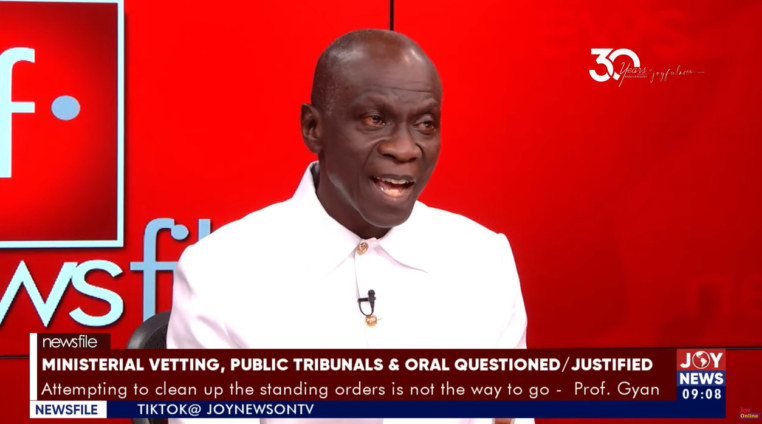Law professor and legal expert, Prof Kwame Gyan, has criticised Ghana’s current system of vetting ministerial nominees, describing it as inadequate and ineffective in assessing the competence and suitability of nominees.
Speaking on JoyNews’ Newsfile on Saturday, January 18, with Samson Lardy Anyenini, Prof Gyan called for reforms to ensure a more rigorous and transparent process.
“We are looking at the technical competence, integrity, and overall suitability of nominees for the roles they’ve been chosen to perform. Yet, the current vetting process does not sufficiently address these criteria,” he remarked.
He emphasised the significance of the process, noting that the collective competence of the 60 ministers to be appointed will shape the destiny of Ghana’s 35 million citizens.
“These 60 people will determine the future of our country and that of unborn generations. If their collective competencies are inadequate, then we are doomed,” he warned.
Prof Gyan highlighted the critical role vetting plays in reassuring the public and international markets. “When nominees like a finance minister are vetted, their responses should demonstrate competence and inspire confidence in their ability to manage key areas like the economy and the cedi. If this doesn’t happen, the markets and speculators will question their capability,” he said.
However, he criticised the current system, which he described as a mere formality. “In Ghana, once the president nominates you, you are essentially a minister. We do not have a history of rejecting vetted nominees. This defeats the purpose of vetting as a rigorous process to assess competency, integrity, and suitability,” he noted.
He also expressed concerns about the omnibus appointments committee, calling it outdated and ineffective. “The omnibus approach is not the way to go. Even with the new standing orders, the process remains flawed. We need to adopt a system that brings out not just integrity but also competency, as seen in the American system,” he suggested.
Prof Gyan advocated for a complete modernisation of the vetting process, proposing that it be treated as a serious job interview.
“These are top-level jobs, and we must ensure the nominees are capable. The rule that allows only two members to ask one question each is insufficient. This process needs to be revised to reflect the seriousness of the positions being filled,” he concluded.
Latest Stories
-
Can Nigeria beat South Africa, Morocco, and Rwanda to host Africa’s Grand Prix?
12 minutes -
E-Vibes musical band series to feature Secondi Band
14 minutes -
UG Corporate Football League set for thrilling grand finale on July 25
24 minutes -
KNUST and the Death of Applied Knowledge (Part III)
29 minutes -
Clifford Danquah crowned Betway Ghana’s first Aviator Legend, walks away with GHS 500,000
42 minutes -
Uphold integrity – Shamima Muslim urges young political communicators
49 minutes -
50 roads under Big Push to start this year – Alhassan Suhuyini
50 minutes -
Ghana to improve infrastructure to support Recreation agenda – Kofi Adams
57 minutes -
Analysis: What’s in the NDC’s first mid-year budget review
1 hour -
ENI applauds Ghana’s investment climate as government pledges stronger support for energy growth
1 hour -
OmniBSIC Bank returns for 2025 JoySports Invitational Tournament
1 hour -
Photos: Ghana defeat Niger to finish third in WAFU-B U20 Boys Cup
2 hours -
Star Assurance signs up for JoySports Invitational Tournament
2 hours -
Indigenous firm Dutylex partners with Petro-Canada Lubricants to expand footprint in Africa
2 hours -
JAPTU Ghana pays courtesy call on IGP Yohuno, POMAB members
3 hours

